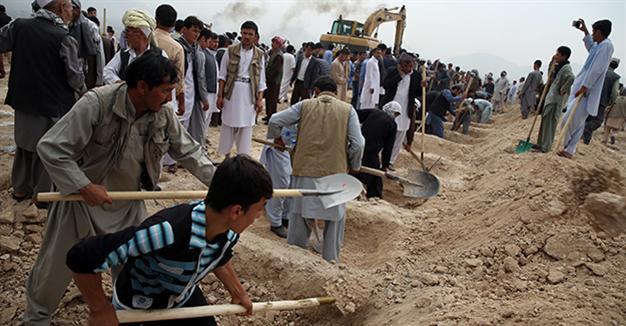Kabul mourns over 80 killed in deadliest attack in 15 years claimed by ISIL
KABUL

Kabul was plunged into mourning on July 24 after its deadliest attack for 15 years killed 80 people and left hundreds maimed, reigniting concern that the Islamic State of Iraq and the Levant (ISIL) was seeking to expand its foothold in Afghanistan.
Tempers were frayed a day after the twin bombings that tore through crowds of Shiite Hazara protesters, as many anxiously searched hospitals and morgues, looking among the mutilated bodies for missing relatives.
The attack in the majority Sunni country highlighted the risk of sectarian disharmony in a nation that has largely avoided the bloody strife between Sunnis and Shiites that plagues much of the Muslim world.
“I promise you that I will avenge the blood of our loved ones on the perpetrators of this crime, wherever they are,” President Ashraf Ghani was quoted as saying by AFP, declaring July 24 a national day of mourning.
The bombings occurred as thousands of Hazara protesters had gathered to demand that a multi-million-dollar power line pass through their electricity-starved province of Bamiyan, one of the most deprived areas of Afghanistan.
“Two fighters from Islamic State [ISIL] detonated explosive belts at a gathering of Shiites in the city of Kabul in Afghanistan,” said a brief statement on the group’s Amaq news agency, according to Reuters.
If confirmed as the work of ISIL, the attack, among the most deadly since the U.S.-led campaign to oust the Taliban in 2001, would represent a major escalation for a group hitherto largely confined to the eastern province of Nangarhar.
The site of the attack, which Ghani renamed as “Martyr’s Square,” remained littered with scorched metal, charred flesh and personal items including shoes, ID cards and protest banners with messages such as “Don’t eliminate us.”
Many protesters defiantly camped there overnight, holding candlelight vigils and reciting Koranic verses even though the government announced a 10-day ban on public gatherings on security grounds.
Dozens of graves were dug with shovels and excavators at a nearby hilltop cemetery, where coffins were brought in, draped in traditional burial shrouds.
Many who survived with grievous wounds overwhelmed city hospitals, with reports of blood shortages and urgent appeals for donors swirling on social media.
The Afghan government is currently in the middle of an operation backed by NATO airstrikes against IS in Nangarhar, after Ghani earlier this year claimed that the group had been defeated.
 Kabul was plunged into mourning on July 24 after its deadliest attack for 15 years killed 80 people and left hundreds maimed, reigniting concern that the Islamic State of Iraq and the Levant (ISIL) was seeking to expand its foothold in Afghanistan.
Kabul was plunged into mourning on July 24 after its deadliest attack for 15 years killed 80 people and left hundreds maimed, reigniting concern that the Islamic State of Iraq and the Levant (ISIL) was seeking to expand its foothold in Afghanistan.